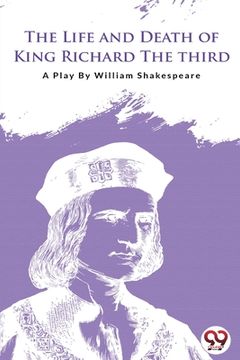Reseña del libro "The Life and Death of King Richard the Third (en Inglés)"
The Life and Death of King Richard III is an authentic play by William Shakespeare, believed to have been written in around 1592. It portrays the Machiavellian ascent to influence and the ensuing short rule of Richard III of England. The play is gathered among the accounts in the First Folio and is most frequently delegated as such. Incidentally, in any case, as in the quartoedition, it is called a misfortune. Shakespeare's most memorable quadruplicate (additionally containing Henry VI parts 1-3). The play starts with Richard (called "Gloucester" in the text) remaining on "a street", portraying the re-growth to the lofty position of his sibling, King Edward IV of England, the oldest child of the late Richard, Duke of York. It is 1471 to infer the year. Currently, it is the colder time of year of our discontent. This sun of York made this a splendid summer, and every mist that lour'd upon our home in the deep chest of the sea covered it. "Son of York" is a play on the identification of the "blazing sun," which Edward IV embraced, and "son of York" refers to, for example, the child of the Duke of York. Richard is a revolting hunchback who is "rudely stamped," "deformed, unfinished," and can't "strut before a wanton ambling nymph." He answers the misery of his condition with an outsider's: "I am determined to prove a villain/and hate the idle pleasures of these days." Richard plots to have his sibling Clarence, who remains before him in the line of progression, led to the Tower of London over a prediction he paid off a diviner to finagle the dubious King with; that "G of Edward's heirs the murderer shall be", which the ruler deciphers as alluding to George of Clarence (without acknowledging it really alludes to Gloucester). Richard currently plans to charm "the Lady Anne"-Anne Neville, widow of the Lancastrian Edward of Westminster, Prince of Wales. He says to the crowd: "I'll wed Warwick's most youthful girl." Did I kill her better half and her dad? Unlike Titus Andronicus, the play avoids realistic depictions of actual brutality; only Richard and Clarence are shown being executed in front of an audience, while the rest (the two sovereigns, Hastings and Brackenbury, Gray, Vaughan, Rivers, Anne, Buckingham, and King Edward) are executed off-stage. Notwithstanding the awful idea of the title character and the terrible storyline, Shakespeare implants the activity with comic material, as he does with the vast majority of his misfortunes. A large part of the humour comes from the polarity between how Richard's personality is known and the way he tries to show up. A scene from Richard III, coordinated by Keith Fowler for the Virginia Shakespeare Festival in Williamsburg, is one of the primary Shakespearean exhibitions in America. (Here Richard is wounded with a hog stick by the Earl of Richmond.) Richard himself additionally gives a few dry comments experiencing the same thing, as when he intends to wed Queen Elizabeth's girl: "Murder her siblings, then wed her; uncertain method of gain." Other instances of humour in this play incorporate Clarence's hesitant killers and the Duke of Buckingham's report on his endeavour to convince the Londoners to acknowledge Richard ("... I bid them that did love their country's good cry, God save Richard, England's royal king!" Richard says, "And did they so?" Buckingham: "No, so God help me, they didn't say anything...") Puns, a Shakespearean staple, are particularly well addressed in the scene where Richard attempts to convince Queen Elizabeth to charm her daughter on his behalf.
William Shakespeare (Stratford-upon-Avon, c. 23 de abril de 1564jul. - Ibídem, 23 de abril/3 de mayo de 1616) fue un dramaturgo, poeta y actor inglés. Conocido en ocasiones como el Bardo de Avon (o simplemente el Bardo), se le considera el escritor más importante en lengua inglesa y uno de los más célebres de la literatura universal.
Según la Encyclopædia Britannica, «Shakespeare es generalmente reconocido como el más grande de los escritores de todos los tiempos, figura única en la historia de la literatura. La fama de otros poetas, tales como Homero y Dante Alighieri, o de novelistas tales como León Tolstoy o Charles Dickens, ha trascendido las barreras nacionales, pero ninguno de ellos ha llegado a alcanzar la reputación de Shakespeare, cuyas obras hoy se leen y representan con mayor frecuencia y en más países que nunca. La profecía de uno de sus grandes contemporáneos, Ben Jonson, se ha cumplido por tanto: "Shakespeare no pertenece a una sola época sino a la eternidad"».
Ver más
Ver menos

